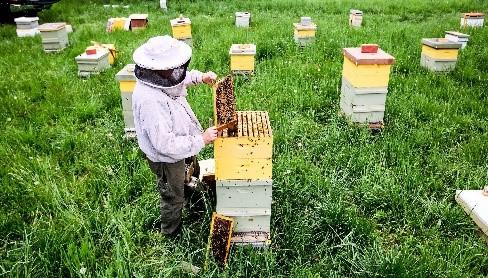WELCOME
An apiary is any location where honey bees are kept — whether it’s a single backyard hive or a large-scale beekeeping operation. The term “apiary” is often used interchangeably with “beekeeping,” reflecting both the practice and the place where it happens.
The Alabama Department of Agriculture & Industries (ADAI) proudly supports agricultural activities that strengthen and sustain our state’s farming community. Because nearly one-third of the food we eat depends directly on insect pollination — and honey bees pollinate more than 100 agricultural crops in the U.S. — beekeeping plays a vital role in our food supply and ecosystem health.
Click here for AL beekeepers buying nucs, packages, or queens produced in AL.
Being a Good Neighbor in Beekeeping
While ADAI recognizes the importance of beekeeping, each beekeeper also shares responsibility for maintaining a positive public image of the practice. Responsible beekeepers are good neighbors who:
- Provide adequate water sources for their bees.
- Position hives carefully to minimize interaction or stings with nearby residents.
- Respond promptly to neighbor concerns.
- Maintain only the number of hives their land can safely and sustainably support.
Before setting up hives, always check with your local zoning office or homeowners’ association (HOA) to confirm that beekeeping is permitted and to learn whether limits exist on the number of hives allowed in your area.
Registered beekeepers are also encouraged to stay in close contact with their state apiary inspectors. These inspectors are available anytime to assist with inspections, questions, or concerns related to hive health and management. They are an excellent resource for identifying diseases or pests, providing guidance on best practices, and ensuring your colonies stay strong and productive. Reaching out to your inspector helps protect your bees — and the wider beekeeping community — from preventable issues.
Understanding Alabama’s Apiary Laws
Beekeepers should be aware of Alabama’s No Comb Law, which prohibits the importation of honey bees on comb — such as established colonies or nucleus colonies (Nucs) — into the state. However, it is legal to import packages or queens, provided they are accompanied by a valid health certificate from the originating state.
Protect Your Bees: Always Ask for a Health Certificate
In Alabama, a valid bee health certificate ensures that colonies sold or moved are free from contagious diseases and pests, protecting both buyers and neighboring apiaries. This certification supports the state’s disease control program, helping inspectors quickly trace and contain outbreaks. By requiring health certificate, we safeguard Alabama’s honey bee population and maintain the reputation of our local beekeepers for selling healthy, quality bees.
Honey Sales and Food Safety
The Food Safety Division of ADAI regulates the processing and sale of honey for food consumption. Under the Alabama Honey Law (2-11-20), anyone collecting, processing, or selling honey or honey-based products must comply with state food safety standards.
For complete guidance on honey production and sales, contact the Food Safety Division of the Alabama Department of Agriculture & Industries for the most current list of rules and regulations.

Contacts
Apiary Administrator - Daniele Spear
(334) 240-7228
daniele.spear@agi.alabama.gov
Apiary Inspector Supervisor - Brittaney Allen
Office: 334-240-7172
or
Cell: 334-202-1781
Brittaney.Allen@agi.alabama.gov
Inspector - Phillip Carter
(334) 414-1666
phillip.carter@agi.alabama.gov
Inspector - Brandon Hargraves
334-922-8996
Brandon.Hargraves@agi.alabama.gov
Inspector - Billy Mullins
334-922-8991
Billy.Mullins@agi.alabama.gov
